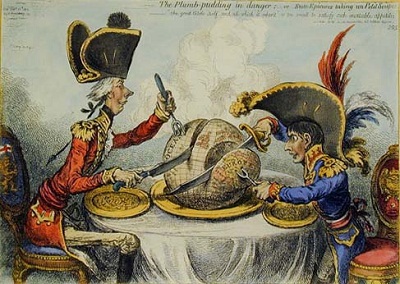Though Americans viewed the War of 1812 as a struggle between their young nation and Great Britain, it appeared to many in Europe as an outgrowth of the long-standing rivalry between Europe’s great powers, France and England.
“The two greatest Commercial Nations in the Globe cannot move in the same Spheres without jostling one another a little… we want Elbow room and these good Neutrals won’t give it to us… they get a few side Pushes, which makes them grumble.” British diplomat Augustus Foster, February 1806

National Portrait Gallery, London
The war that broke out in North America in 1812 had its roots an ocean away in Europe. For more than a generation, France and Great Britain had struggled for supremacy on the continent, waging war on both sea and land. At the beginning of the nineteenth century, their struggle began to change—in ways that would eventually draw the young United States into the conflict.
Two significant battles in Europe at the end of 1805 began to change the strategic picture between France and Great Britain. In October, the English admiral Horatio Nelson’s decisive naval victory at Trafalgar confirmed Britain’s undisputed dominance at sea, and ended French emperor Napoleon Bonaparte’s hopes for a cross-channel invasion. The following December, Napoleon’s victory at Austerlitz cemented the French Army’s dominance of the European continent. With the British ruling the waves and France ascendant on land, their struggle had reach a military impasse. Both sides turned to economic warfare in the hopes of breaking the deadlock.
That economic warfare between the two great powers reached across the Atlantic to the United States. From about 1793 to 1805, Americans had benefited from the struggle between the two rivals. As one of the world’s major neutral shippers, the United States profited from the military struggles between the European powers by servicing both sides. With the military struggle deadlocked, however, France and Great Britain became unwilling to allow neutral shippers. Both powers passed economic measures and counter-measures designed to prevent neutrals from aiding their opponent.
Thomas Jefferson’s administration attempted to respond to these European measures with peaceful coercion using the “restrictive system”. Jefferson intended to apply economic pressure by restricting trade with both nations, avoiding the necessity of military action. But Jefferson’s economic measures failed—and that failure convinced many Americans that the nation could only respond to Britain’s economic warfare with military force.
For most Americans, the War of 1812 appeared principally a struggle between their young government and their old imperial power, a kind of “Second American Revolution.” From a more global perspective, however, the fighting in North America was another outgrowth of the longstanding struggle between France and Great Britain for domination in Europe.
Last updated: May 24, 2016
